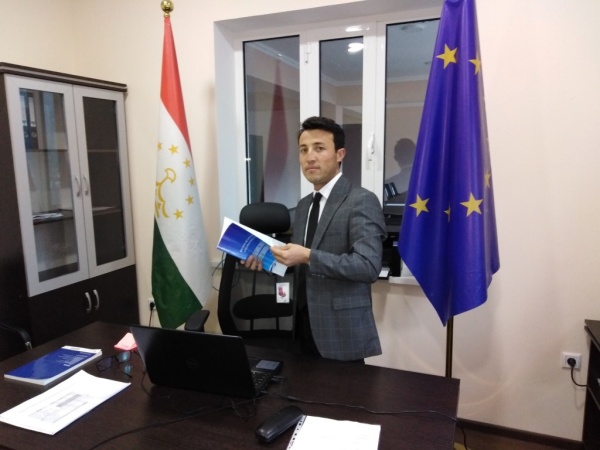The Zarafshon Integrated River Basin Project (ZIBP)
2016 - 2020
The Zarafshon River in Tajikistan flows for 300km due west from the Zarafshon glacier on the border with Kyrgyzstan (see map), down to the provincial town of Panjakent and beyond to the plains of Uzbekistan.
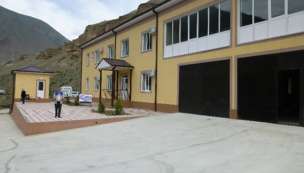
The name Zarafshon means 'spreader of gold' in Persian, referring to the presence of gold-bearing sands in the upper reaches of the river.
The Zarafshon river basin is one of five main river basins in Tajikistan, and it covers a total area of 12,512 km². However, when including the Uzbek part of the Zarafshon river basin, the area is much bigger still.
The Zarafshon Integrated Basin Project (ZIBP) managed by Landell Mills started in June 2016 and is set to finish, after a 6-month hiatus owing to COVID-19, at the end of December 2020. The project is funded by the European Union under the umbrella of its Rural Development Programme (RDP).
ZIBP promotes the sustainable management of water – which is essential for rural livelihoods, food security, electricity and domestic water supply, sanitation and the environment – through an integrated water resources management (IWRM) approach.
The project’s mandate is to provide technical assistance to the Government of Tajikistan, to build institutional capacity in IWRM and also contribute to sustainable management and protection of water and land resources.
At the same time as geographically concentrating its efforts on the Zarafshon River Basin, coordinating with other implementing partners under the RDP including the World Bank’s irrigation rehabilitation project and two upper catchment management projects implemented by NGO consortiums, the Project has also succeeded in supporting central policy and strategic planning through a close working partnership with the Ministry of Energy and Water Resources (MoEWR).
Achievements
After four years of implementation the project’s main achievements included:
- Development of the National Water Strategy for Tajikistan.
- Drafting of the Zarafshon River Basin Plan.
- Supporting the establishment of the Zarafshon River Basin Agency (RBA) and providing training to RBA staff on all aspects of IWRM.
- Development of practical management tools and training material using case studies to promote water use efficiency, specifically in respect of irrigation water distribution.
- Production of the Zarafshon Basin Atlas.
- Development of the Zarafshon basin model, the first of its kind in Tajikistan, including provision of support and planning at various temporal and spatial scales.
Training
Training of the Zarafshon RBA staff started well in advance of the actual construction of the new RBA building in Ayni (completed in July 2019 under the World Bank sister project), through the selection of a preliminary Zarafshon Basin Working Group (ZBWG).
The establishment of the ZBWG fitted with the overall Water Sector Reforms Programme (2015-2025) of the Republic of Tajikistan, where the working groups established for each of Tajikistan’s five river basins, would in 2020 become the river basin agencies for their respective basins.
Having passed a rigorous selection process in May 2017, the 13 selected candidates from the Zarafshon valley were officially recognized as trainees under the ZBWG and subsequently received more than two years of intensive classroom-based and on-the-job training and mentoring in all aspects of IWRM. This included education on the water cycle, river basin dynamics, hydrological processes, the design of irrigation systems and water distribution, social water management, upper catchment management, hydrological infrastructure operations and maintenance, river flow measurements and water quality monitoring.
The ZBWG trainees thereby developed the capacity, knowledge and skills to make a positive contribution both to the implementation of IWRM in the Zarafshon Basin, and the water sector in Tajikistan more widely. The trainees were also grouped according to their specialisations, and received more focused training to prepare them for specific roles under what would become the RBA.
The examination and interview process of the ZBWG members to determine the seven candidates who would form the personnel of the new RBA was organised by the MoEWR on 6 May 2020, and the positions were officially announced on 11 June 2020.
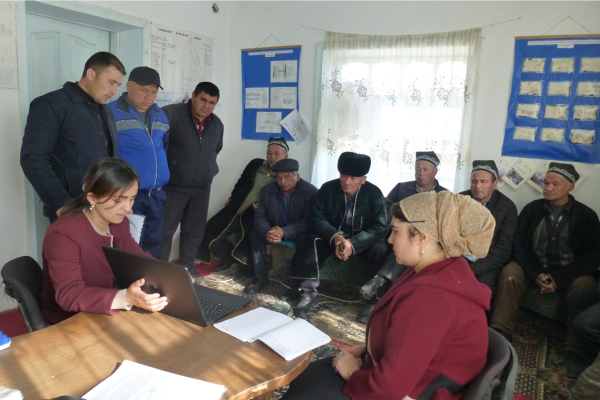
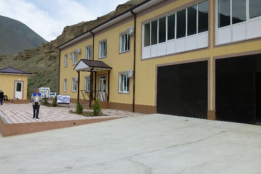
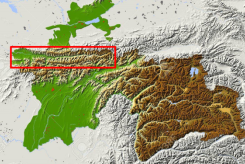
Success stories
The new recruits officially started work as Government employees under the MoEWR in July 2020, which was the culmination of a successful process overseen by the EU/Landell Mills project. One of the successful graduates was Ms. Mehrangez Razzoqova, the only female member of the newly-formed Zarafshon RBA.
Mehrangez had excelled under the Landell Mills training programme, becoming particularly competent in the application of the irrigation water allocation tools introduced under the Project.
The role of women in the water sector remains limited because women are under-represented, despite the ability of female staff members in the sector. The National Water Strategy, a recently-published seminal Government of Tajikistan document which the Landell Mills project helped draft, states unequivocally that ‘the participation of women in the decision-making process is not sufficient’.
Mehrangez undoubtedly has the capacity to be a future decision-maker and leader in the water sector in Tajikistan and Landell Mills/EU project is glad to have been able to support her in achieving her goals, and in so doing, supporting women’s empowerment in Tajikistan.
Mehrangez Razzoqova
'Since childhood I had a dream to become a teacher and transfer my knowledge to young people, and those who needed to learn something new. I had reached my dream but after I had been chosen as a communication/stakeholder specialist for Zarafshon Integrated River Basin Project, I discovered a new road in front of me. With the support of the project I entered to Tajik Agrarian University to increase my knowledge, [and] to be able to meet with expectations of project management. As a member of the project working group, we gained more knowledge from Tajik professors’ staff and new technology programs of water management from Landell Mills international experts. During project implementation phase, I met with the chairmen of the Water Users Associations, mirobs and farmers on the efficient use of water resources. Based on experience I realized that I have a strong interest in water and agriculture, and that with a little more knowledge I could use my teaching skills to solve the problems of water management issues affecting farmers in my local area. Also by my gender, I could be the most needed specialist as there are many women among the group of farmers.
Now my goal has changed as I have wider knowledge of management of water resources, and soon after graduating from the Tajik Agrarian University my background field will be enhanced. My dream now is to become a female specialist of water resource management in [the] agriculture sector of my country.'
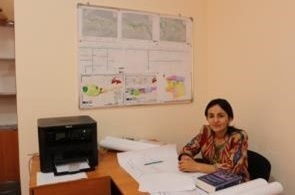
Afroz Azizov
Another of the candidates to graduate from the ZBWG to become a member of the RBA staff was Mr. Afroz Azizov. Coming from humble beginnings as a farmer’s son in a remote corner of the Zarafshon Valley, Afroz was selected as the Deputy Head of the Zarafshon RBA.
'I was born in 1990 and grew up in a farmer family in Sangiston village in Ayni district. Through hard work and being an ambitious and quick learner, I did well in my education and managed, in 2017, to be selected as a member of the Zarafshon Basin Working Group. During the two years of training provided by Landell Mills, I proved myself to have the organizational, analytical and planning skills to be an important member of the team particularly in the areas of monitoring, IT and database development. With these new tools I felt well-prepared and eager to support the development and protection of water resources in the Zarafshon Valley.
As a result in June 2020 I passed the examination and was selected as Deputy Head of the Zarafshon River Basin Agency. I can now provide the leadership to make a positive difference in water resource management in my region.
The project has taken a simple village boy, trained him up with technical skills including QGIS and now he is deputy Head of the Zarafshon River Basin Agency – really I can’t believe it! I would like to thank Landell Mills and the European Union for the great opportunity they have given me.'
